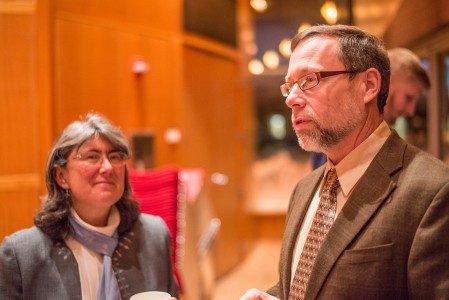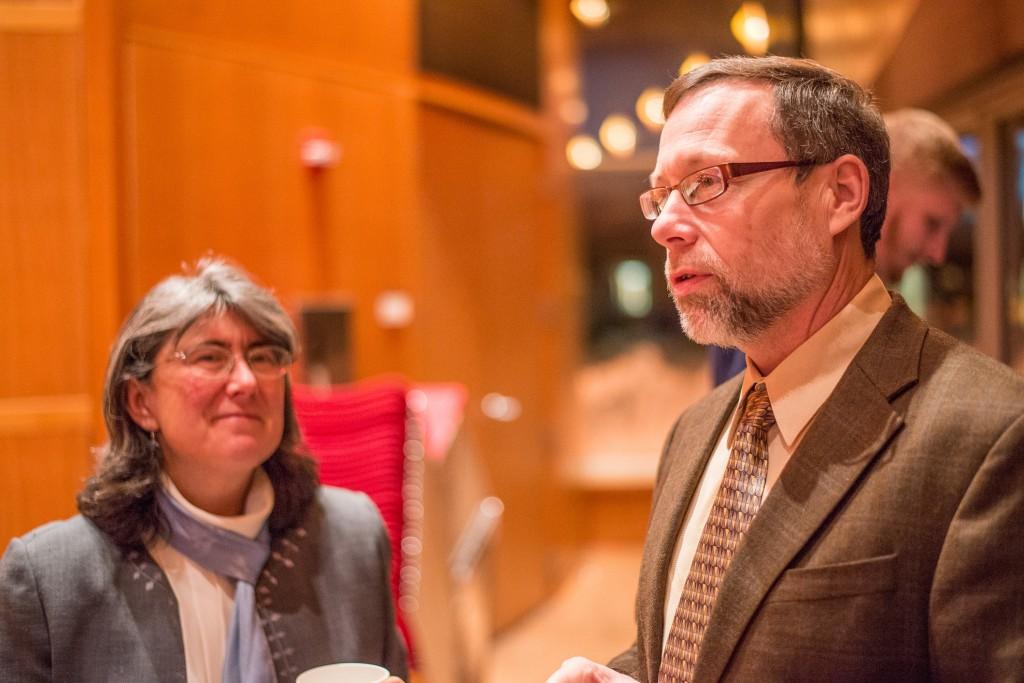Snow couldn’t diminish student interest in the Rosenfield Program’s three-day symposium “Politics and Society in Putin’s Russia,” as JRC 101 filled with students, faculty, staff and community members interested in the nuances of Russia’s charismatic leader.
Three events were delayed, including Wednesday’s convocation address by prominent journalist and LGBT activist Masha Gessen, as a snowstorm trapped multiple speakers in Chicago. Despite the altered schedule, attendance remained strong.
The symposium covered a range of issues in contemporary Russia and was sponsored by the Rosenfield Program, along with the Russian, Central, and East European Studies concentration and the John Crystal Distinguished Foreign Visitor Endowment. Prominent professors and journalists from around the country came to Grinnell to speak.
“Our goal was to find a group of strong speakers who could address some of the biggest issues facing Russia today,” said Edward Cohn, History and Rosenfield Program committee member.
The snowy atmosphere seemed fitting considering the topic of the first talk: “The Sochi Olympics and Putin’s Russia,” which was in part the inspiration for the symposium.
Bob Orttung, an Associate Research Professor of International Affairs at The George Washington University, gave the talk, which focused on regional politics, economic development, corruption and terrorism surrounding the 2014 Sochi Winter Olympics.
“[The Olympics] brings together a lot of the aspects of Russia today,” Orttung said.
Orttung described how the Sochi Games attracted a huge amount of infrastructure to a city that had never previously been subject to world attention. Many people are calling this Olympics “the most expensive and the most corrupted ever,” he said.
“I found the talk to be incredibly informative on a range of issues, from budget to security,” said attendee Sarah Arena ’16. “In particular, I appreciated that he contextualized the Russian politics and mitigating circumstances at work in these issues.”
Russia has loomed large in the public mind in recent months, due in part to the Sochi Olympics, a string of anti-gay laws passed by the Russian parliament, a political crisis in Ukraine and the decision of the Russian government to grant asylum to former NSA contractor Edward Snowden.
But the impetus for the symposium originated in the fall of 2012 in the aftermath of the arrest and trial of punk rock collective Pussy Riot for protesting the Russian Orthodox Church’s role in supporting President Vladimir Putin’s reelection.
“The Rosenfield Program was delighted when [the Russian, Central, and East European Studies concentration] did their great proposal last year and we took up the cause as our own,” said Rosenfield Program Director Sarah Purcell. “We came up with an exceptional line-up, speakers and events to educate us here at Grinnell College and to help us have conversations about Putin’s Russia.”
Gessen’s convocation address was a highlight of the symposium. Her talk was based on her recent book “Words Will Break Cement: The Passion of Pussy Riot,” which offered a biographic narrative of Nadya Tolokonnikova, Maria Alyokhina and Yekaterina Samutsevich, three Pussy Riot members who were arrested in 2012.
Gessen’s entertaining speaking style and use of anecdotes was popular with the audience.
“I think the talk [was] really interesting because I learned particular stories behind the event,” said Tina Chen ’16. “The lecture [helped] me to develop an interest in Russia, and it [was] easy to understand for those who have no background in political issues.”

A talk on Wednesday evening, “Putin, Hypermasculinity, and the Construction of Charisma,” shed light on the image of masculinity Putin has projected and how he has used it to solidify his hold on power.
MIT history professor and co-director of the MIT-Russia Program Elizabeth Wood spoke about how Putin’s use of vulgar language serves to emasculate his political opponents and strengthen his own image.
A hypermasculine persona was Putin’s way of uniting the country in the absence of ideology in Russia following the collapse of the Soviet Union, Wood said.
Putin also used his masculinity to place himself above politics, which is seen as dirty in Russia, and identify himself with the common Russian through behavior uncommon to politicians, she said.
The symposium also included presentations addressing Putin’s personalist regime, the Russian government’s response to mass protests in 2011-2012 and minorities and immigrants in Moscow.
Professors expressed their satisfaction with the symposium and said they hoped it provided students with a more rounded understanding of Russia’s complex political and social landscape.
“Every single person we have recommended was on the list,” said Danielle Lussier, Political Science. “So we have our real A-list speakers for this week.”
“Russia is a country with a complicated history and a political system that can seem mystifying to outsiders,” Cohn said. “And we would love to give students the context they need to understand events in contemporary Russia, while alerting them to the issues they need to truly understand what’s going on in Moscow today.”


































































